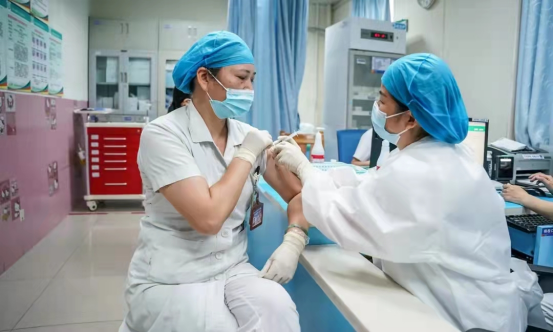At Least 9 Provinces in China Launch Booster Shots for Key Groups
At least nine provinces in China launch booster shots for key groups, ‘helpful supplement measure’ for Beijing Winter Olympics.

A medical staff member receives a booster shot of a COVID-19 vaccine on Saturday in Nanning, South China’s Guangxi Zhuang Autonomous Region. Photo: VCG
As the winter comes and the Beijing 2022 Winter Olympics approaches, China is accelerating the inoculation of booster shots for key groups, with at least nine provinces and regions having started the campaign to further consolidate the nation’s epidemic prevention and control achievements, and to improve the protection efficacy for people at high risk of infection in a timely manner.
In the latest move, cities in four provinces including East China’s Anhui, Fujian, Northeast China’s Heilongjiang, and Central China’s Hubei and in South China’s Guangxi Zhuang Autonomous Region launched the campaign during the weekend.
Nanling county in Wuhu, Anhui launched booster shots for people who completed the vaccination six months ago on Friday. Prior to that, several districts in the city had already started booster shots.
A community in the city’s Jiujiang district released a notice on Thursday, advising people aged between 18 and 59 who finished two doses of inactivated vaccines six months ago to get a booster shot with the same vaccine.
Other cities in Anhui including the capital city Hefei and Fuyang also started the booster shots on Saturday.
In East China’s Fujian Province, two cities – Jinjiang and Xiamen – started booster shots on Saturday and Sunday in succession. The whole province had just returned to low-risk status on Thursday after a flare-up that began on September 10. The outbreak spread to Putian, Quanzhou, Xiamen and Zhangzhou, where many infected people had completed their vaccination series when they contracted the Delta variant during the resurgence.
In Jinjiang, a booster shot for people at high risk is set to be accomplished by October 20. In Xiamen, a booster shot will target people aged 12 and above who have finished two doses of inactivated vaccines or the one-shot recombinant adenovirus vector vaccine six months ago. They will take a booster shot with the same technical route as the vaccines they took.
So far, the Global Times has learned that dozens of cities in at least nine provinces and regions have given or soon will give booster shots to key groups.
China had administered 2.22 billion doses of COVID-19 vaccines as of Saturday, according to the National Health Commission.
A Beijing-based immunologist told the Global Times on condition of anonymity on Sunday that the intensive policies rolled by these cities across the nation recently may be related to the upcoming Beijing 2022 Winter Olympics.
Although the Games will absolutely have very strict prevention and control measures, a booster shot for the key groups can be a very helpful supplement, said the expert.
Tao Lina, a Shanghai-based vaccine industry insider, told the Global Times on Sunday that scientific research showed that antibodies in recipients turned negative after six months and booster shots can better protect key groups.
Protection efficacy was raised to 80 percent or above after inoculation with a third dose of SinoVac COVID-19 vaccine as a booster, with protection efficacy for infections with symptoms raised from 56 percent to 80.2 percent and from 84 percent to 88 percent for those who needed to be hospitalized, the company announced on Saturday, citing the latest research result in Chile.
Zheng Zhongwei, director of the Development Center for Medical Science and Technology of the National Health Commission, and head of the national working group for vaccine development, told a press conference on August 27 that three groups of people can receive booster shots six months after the completion of two doses. These groups at high risk of infections include those who work at customs and border inspection offices, those in the aviation industry, employees of quarantine centers and staffers at designated medical institutions.
https://www.wuhu.gov.cn/English/News/32420071.html
